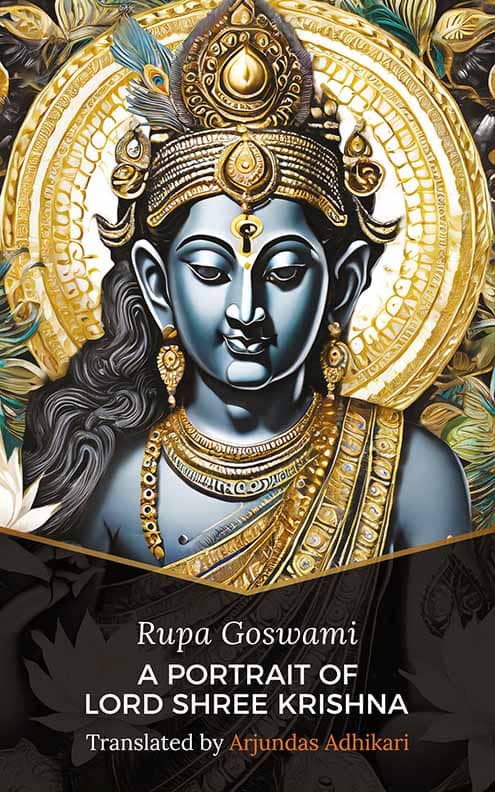
Sanskrit Terms Relating to ‘actor’
In case there are any doubts Rupa Goswami didn’t intend his Sanskrit drama, Vidagdha Madhava, aka, A Portrait of Lord Shree Krishna, (translated into English by Arjundas Adhikari) to be staged, I would like to share a compilation of Sanskrit terms relating to dramaturgy. The list goes to show what a developed and popular performance art Sanskrit drama has been. The subject matter of Rupa Goswami’s A Portrait of Lord Shree Krishna, is common to many of these dramas, demonstrating the enduringly popular nature of Krishna-following in India over time. To begin with follow some of the Sanskrit terms indicative of, or expressive of the word ‘actor’ :-
- anu-kartri – an imitator, actor
- akshiptika – song sung by actor approaching stage
- abhra-phullaka – actor
- ardha-maanava – actor dressed like Krishna
- ardha-maanusha – actor dressed like a god
- udghatyaka – abrupt interruption in the prologue of a drama
- eka-nata – principal actor in a drama, or reciter of prologue
- kathaka – chief actor
- katha-prana – introducer of a drama
- kalahala-kandala – name given an actor
- kushilava – an actor or bard
- krishashva – an author of directions to players
- krishashvini – a dancer or actor
- keli-kosha – a dancer or actor, lit. ‘receptacle of amusement.’
- kaushilava – the profession of an actor or dancer
- gishnu – an actor
- geshnu – professional actor
- gunarama – name given to an actor, lit. ‘pleasure grove of good qualities.’
- ghatana – actor
- charana – a wandering actor or singer
- charana-dara – wandering actors’ wives
- charanaika-maya – inhabited only by wandering actors
- dharmi-putra – an actor, player
- darshaka – an actor
- dhaatri-putra – an actor
- nata – actor
- nataka – an actor
- natacarya – an actor’s performance
- nataka-melaka – a company of actors
- namata – actor
- nartaka – actor
- naatya – costume of an actor
- naatya-dhara – costume of an actor
- nepathya – costume of an actor
- panchajanina – an actor
- paatra – an actor’s part in a play
- paatra-varga – company of actors
- parshvastha – an actor in the prelude of a drama
- pitambara – an actor
- paripatram – by every actor
- prayuj-yoktri – an actor
- prayogin – an actor
- prahaas – an actor
- bhadra – name given an actor
- bharata – an actor
- bharata-putra – an actor
- bharata-vakya – epilogue of a drama
- bhavananda – name given an actor
- bharati – the Sanskrit speech of an actor
- bhaavata – an actor
- bhumi – the part played by an actor
- bhumika – an actor’s part
- bhroo-kunsa – a male actor in female attire
- mandayanta – an actor, lit. ‘an ornament.’
- maha-nata – great actor
- marisha – principal actor
- raksha-pekshaka – actor
- ranga-cara – actor, lit. ‘stage-goer.’
- ranga-jivaka – actor, lit. ‘living by the stage.’
- ranga-taranga – name of an actor
- ranga-mangala – name of an actor
- ranga-jiva – an actor, lit. ‘living by the stage.’
- rangavatarana – profession of an actor, lit. ‘entering on the stage.’
- rangopamardin – actor who dresses as Ravana, lit. ‘injuring the stage.’
- lashva – an actor
- laasaka – an actor
- layarambha – an actor, lit. ‘moving according to time.’
- varnaka – the dress of an actor
- vasantika – the buffoon in a drama
- vishkambha – an interlude between acts performed by an inferior actor, or actors, who explain to the audience the progress of the plot
- vikshya – actor
- vira – an actor
- veshya – masked (as an actor)
- vaihaasika – a comic actor
- shailaalin – actor
- shailaali-yuvan – young actor
- shailoosha – an actor
- shailooshaka – inhabited by actors
- shobhanika – a kind of actor
- sarva-keshin – actor, lit. ‘having all kinds of head-dress.’
- sarva-veshin – actor, lit. ‘having all dresses.’
- soo-danta – actor, lit. ‘having handsome teeth.’
- soochaka – chief actor of a company
- sootra-dhaar – principal actor who superintends the whole performance
- sthaan – the character of an actor
Arjundas Adhikari

